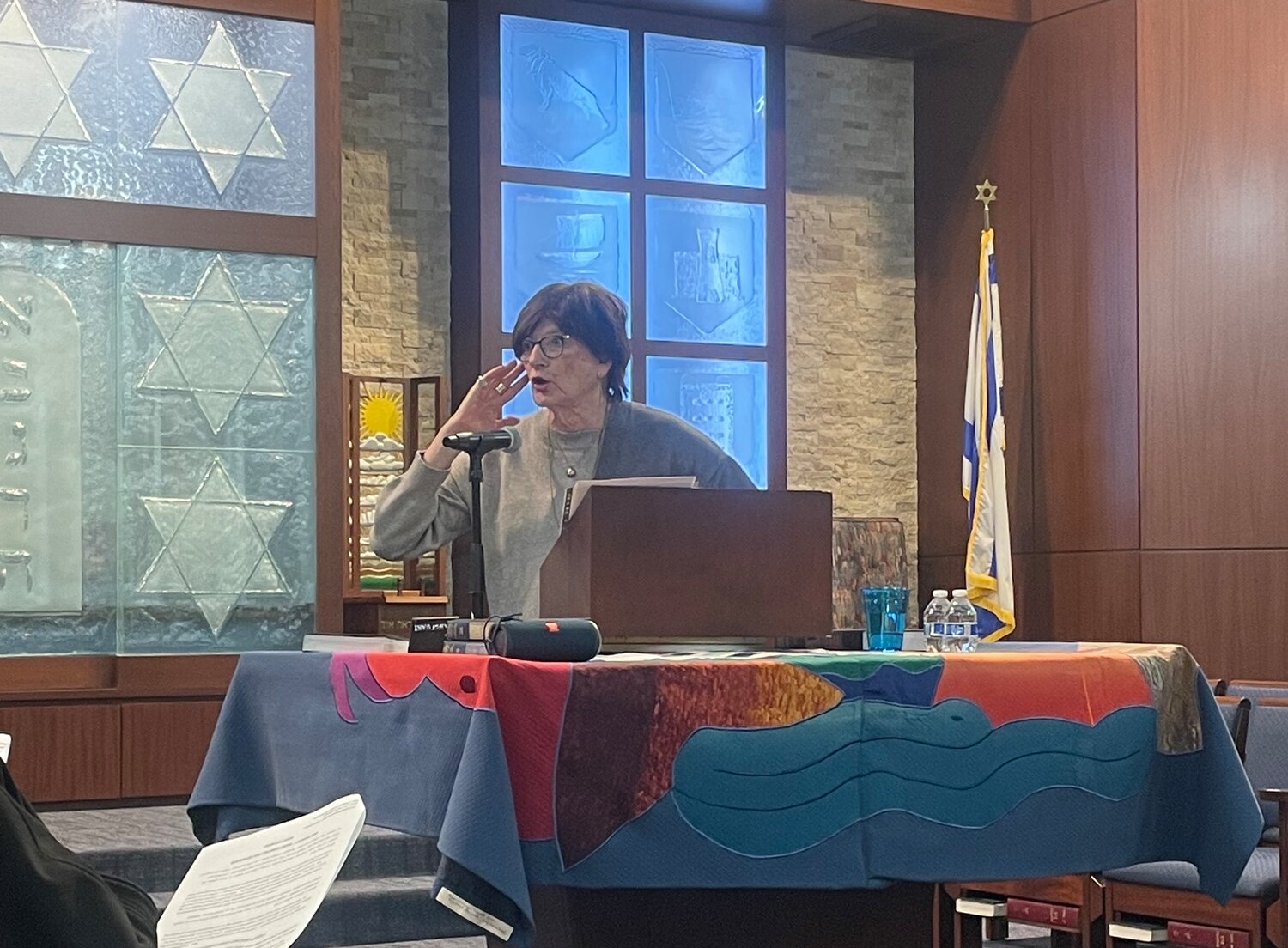At Congregation Beth Ohr, finding unity in times of war
Congregation Beth Ohr welcomed speaker Yiscah Smith — who is a thought leader and spiritual activist — to its shul on Nov. 5, leading congregants in readings and teachings that hit close to home for many with the ongoing war in the Middle East.
Last month, Hamas, a terrorist organization that occupies the Gaza Strip, attacked Israel, killing thousands and taking hundreds captive. Israel retaliated, and in the weeks since the fighting began, many American Jews have had a hard time watching a country they have such a strong connection to face the aftermaths of the initial attack. Across the world, protests and demonstrations, rooted in antisemitism, have been held, making many Jews fear for their safety.
Smith, who is originally from New York and now based in Israel, met Beth Ohr’s rabbi, Rishe Groner, when Groner was studying abroad. The synagogue welcomed Smith earlier this year, and it was also planned that she would visit a second time. But during her visit earlier this month, the overarching meaning and message behind her teachings felt all the more powerful, comforting and important.
Groner referred to Smith as “a thought leader, a spiritual activist and an agent of change.”
“Yiscah views Judaism as a spiritual practice and relies on Jewish spiritual teachings to inform,” Groner said. “As a spiritual trailblazer, Yiscah exemplifies what it means to carve one’s own path, as she has grappled with the entanglement at the intersection of spirituality, Jewish tradition and a passionate desire to live a life of authenticity.”
Smith’s discussion at Beth Ohr was titled “Honoring the Spirit in Times of War — Strengthening Am Yisrael.” Throughout her hour-long speech, Smith read excerpts from Rav Kalonymus Kalmish Shapira, the Grand Rabbi of Piaseczno, Poland, who authored a number of works and was murdered by German Nazis in a concentration camp during the Holocaust. Smith also read the work of Rav Kook, the first Ashkenazi Chief Rabbi of British Mandatory Palestine.
“There’s so many layers and dimensions to the complexity of what’s really happening in Israel,” Smith, who has lived in Israel for most of her adult life, said.
The excerpts that Smith focused on throughout her discussion reflected themes of Jewish unity, self-reflection and self-understanding, spiritual contemplation and the power of vulnerability.
“Even when a person finds oneself greatly submersed in the depths of life’s mire, like today, like we’re in this gook, and we don’t know how to get out of it — it’s like quicksand of so much violence and hatred and sadness and death,” she said. “The trauma is incredible, and we’re in the middle of it. Even when we find ourselves in that, cultivating the practice of secluded contemplation of one’s inability will provide a way for that person to return to that which have previously been lost.”
Rabbi Groner said many Jews living outside of Israel feel a sense of fear and horror when they watch the news.
“And I think in Israel, it’s the same thing — everyone’s seeing what they have going on, and then also what they see from the news here,” she said. “And I’m worried about the disconnect that I’m sensing from what I’ve talked to my friends there, and people here. We’re so tormented by what we see happening to our siblings that we’re not seeing the positive pieces of it.”
Smith said in Israel, people are taking care of each other, mourning those who have died while putting their energy towards helping the people that are still alive. Whether by aiding those who’ve evacuated their homes with little to nothing, or Israelis volunteering to dig enough graves to bury the dead, they’re taking care of each other and uniting.
Smith visited New York City with her sisters last week, she said, wearing a necklace with the Star of David on it, which she always wears.
“When I went into the city the other day, one of them said, ‘Are you sure you want to leave this out?” Smith said of her necklace, holding it as she spoke at Beth Ohr. “I said, ‘Am I sure I want to wear it out? Of course I want to wear it out. I always wear it out. I’m in New York!’ They said, ‘Just to be careful’ — I grew up in New York.”
The rise in antisemitism, the hate directed at the Jewish people, and the fear that Jews are living with is unimaginable, Smith said.
“We are more concerned for you, than we believe you’ll ever be concerned for us,” Smith said. “My concern is a very different concern. We are taking care of each other — we are uniting.
“This,” she said in reference to antisemitism around the world, “is really scary. I think some conclusive answer is we need to be more aware of what each other is really experiencing. Israelis really need to know more of what you are afraid of, and you all need to know what we’re really living with every single day.”
Smith encouraged paying attention to Israeli media, in particular I24 news, which broadcasts in English. It can be accessed online at I24News.tv/en.
Rabbi Groner thanked fellow Merrick-Bellmore synagogues for helping make Smith’s visit possible. Beth Ohr is actively selling Israeli flag stickers, suitable for laptops, water bottles, mugs and more, with all proceeds benefitting Israel and Israel Defense Forces. Beginning Nov. 25, Beth Ohr is also offering a 10-week Challah subscription, with proceeds benefiting various charities that support Israel. For more information, visit CBOhr.org.

 60.0°,
Overcast
60.0°,
Overcast 




